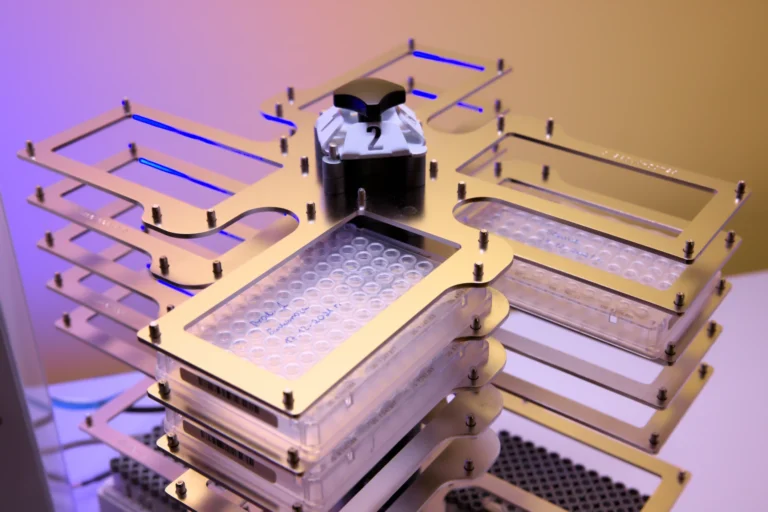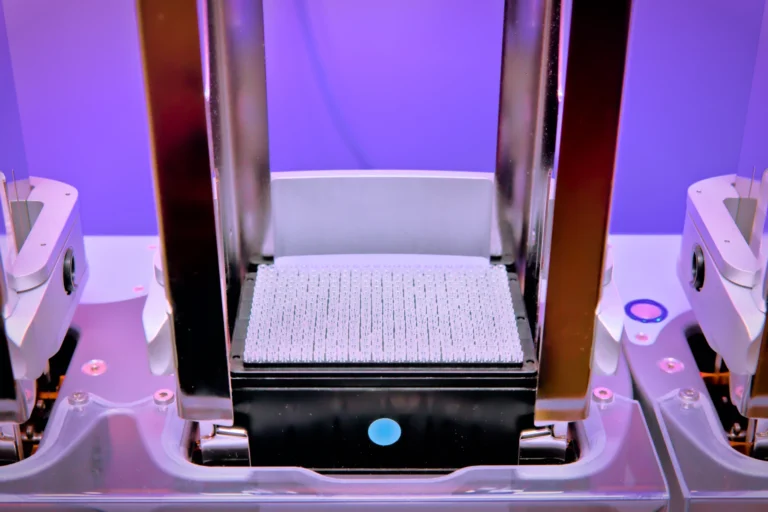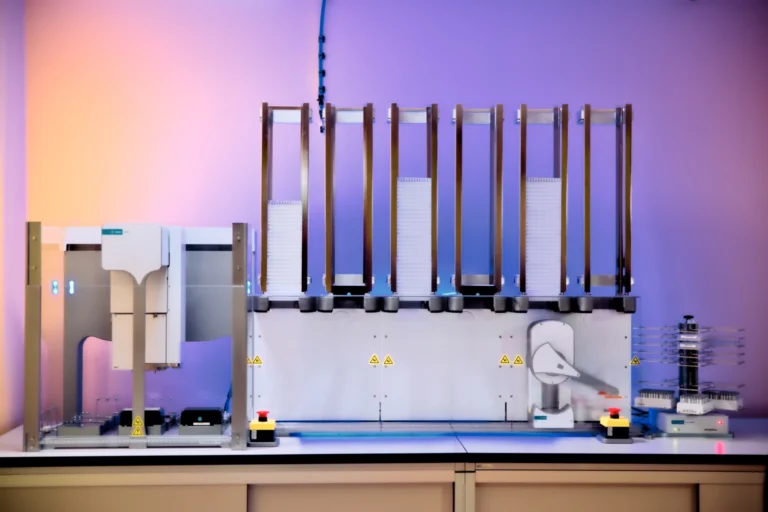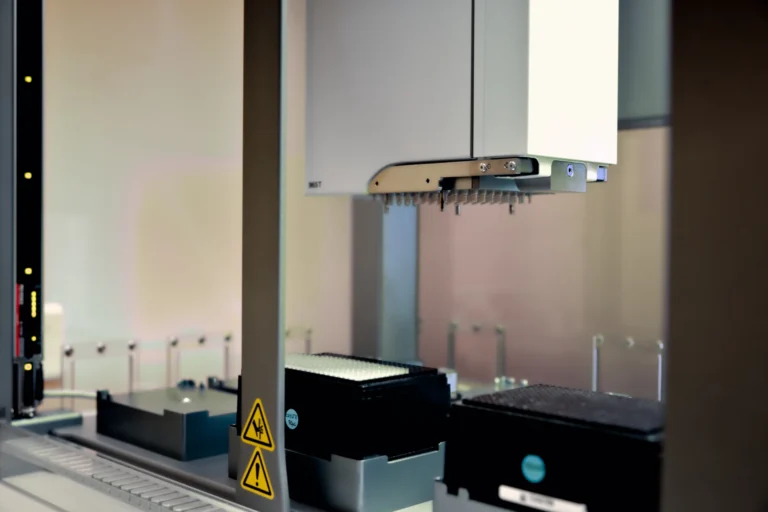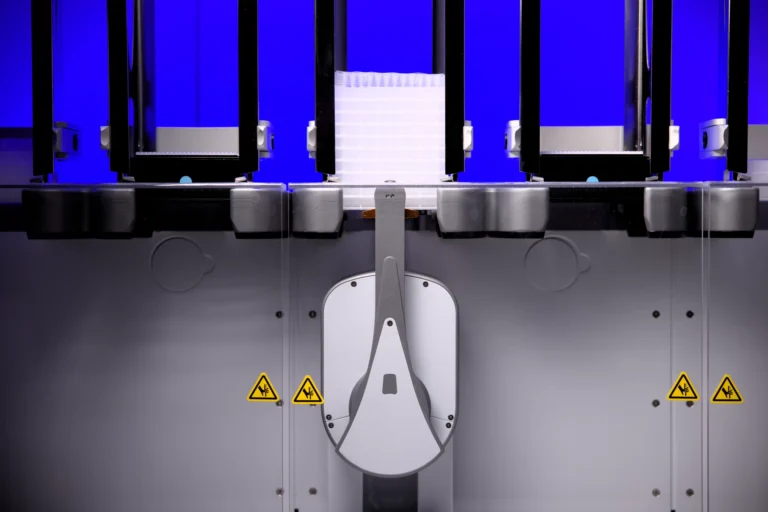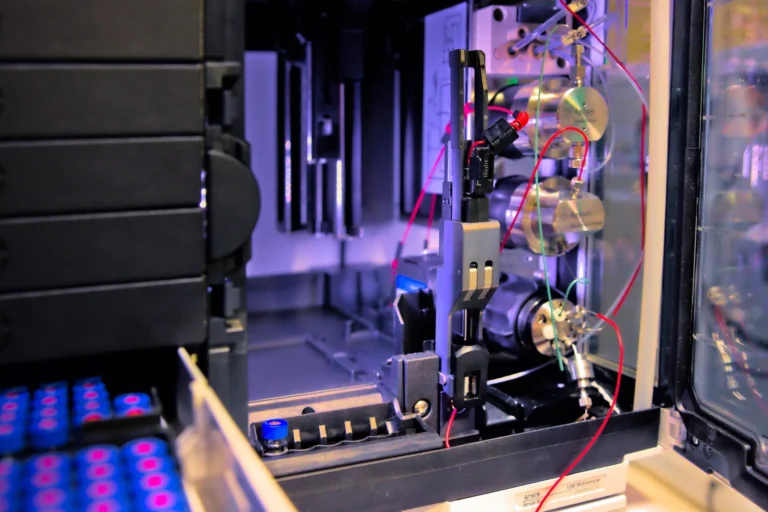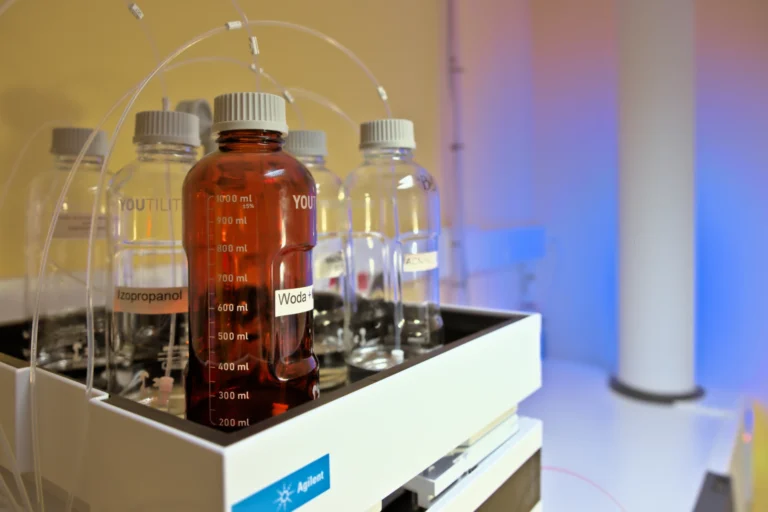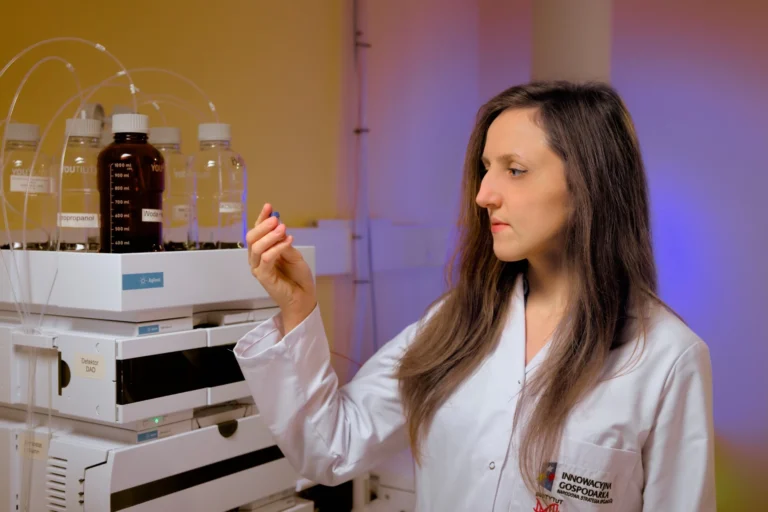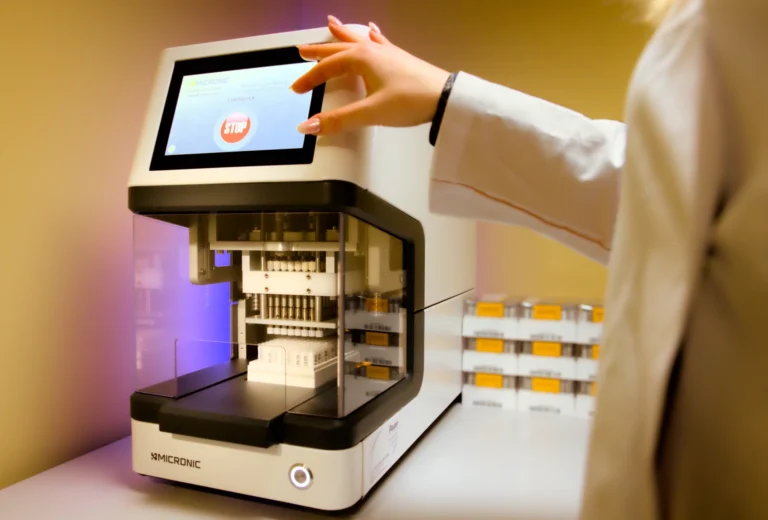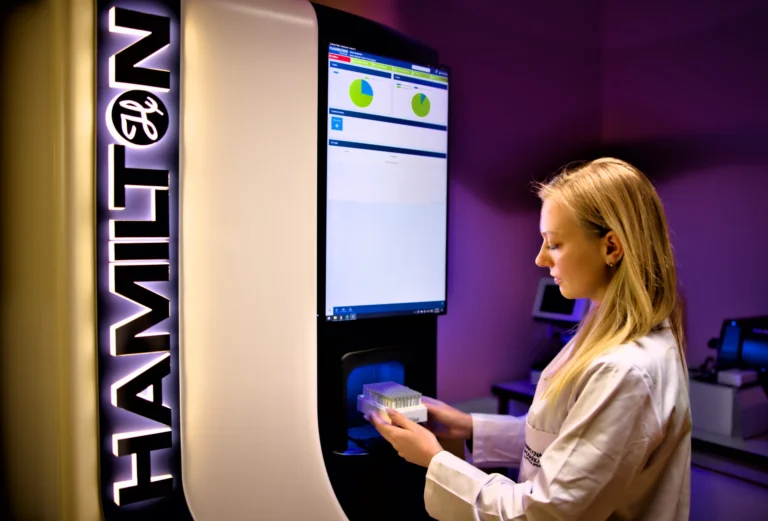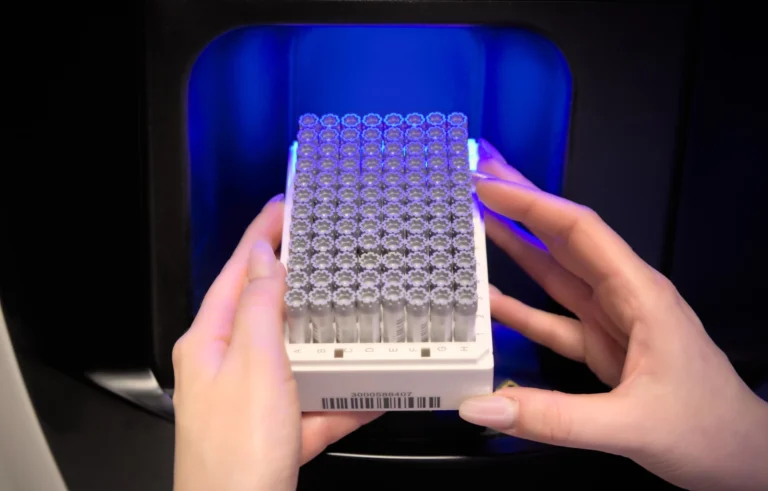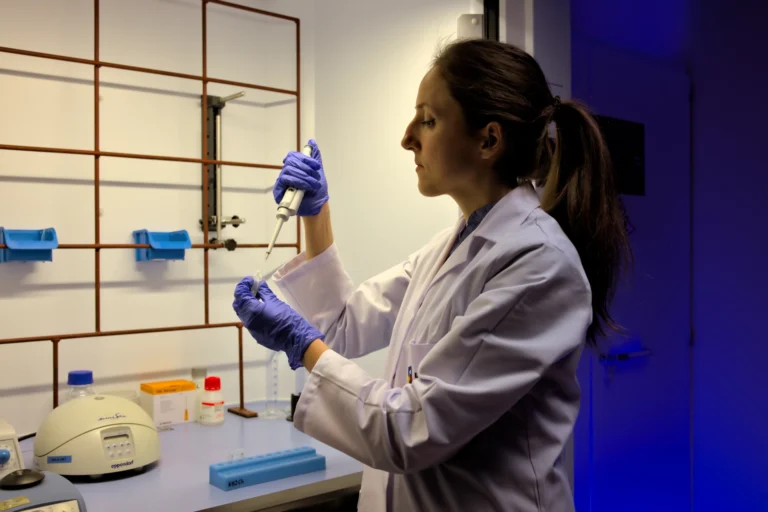About us
The importance of screening infrastructure for new biologically active compounds and drugs
Biologically active compounds are used in many areas of our life, as medicines, plant protection products, cosmetics, compounds used in the food industry or environmental protection. Their production and sale is an essential part of any developed economy, and the pharmaceutical industry is one of its most profitable branches.
Currently, the main methods of searching for new bioactive compounds are high-throughput testing of large collections (libraries) of chemical compounds, modification of natural compounds or already known drugs, and recently, more and more often, the design of new molecules using molecular modeling (in silico) using methods of computational chemistry and biology.
Organic, biological and medical chemistry in Poland are among the fields which, due to their enormous potential and international position, can generate important innovative solutions in the short term and with relatively little expenditure, which can be used in medicine, pharmacy, cosmetology, agriculture or environmental protection. Every year, many new chemical compounds are synthesized in national laboratories, some of which have the potential to become drugs or other biologically active compounds. Unfortunately, in a few cases, systematic studies of the properties of these compounds are carried out, most often in cooperation with foreign centers, rarely in domestic laboratories. As a result, the application potential of most of the synthesized compounds remains unnoticed.
The basic problem faced by Polish chemists is therefore the lack of possibility to quickly and comprehensively test the biological activity of compounds produced in domestic laboratories. Poland’s accession to EU-OPENSCREEN ERIC (European Research Infrastructure Consortium) may be an extremely important factor in overcoming this unfavorable situation. In addition, participation in the project will enable the use of resources accumulated in other European laboratories and participation in international projects aimed at searching for new biologically active compounds. Poland’s joining EU-OPENSCREEN ERIC, through the participation of qualified national laboratories in this project, will contribute to a better use of both the results of national research in various areas of chemistry and pharmacology, as well as the generated knowledge about the characteristics of intellectual property and commercial value.
The intensification of screening tests in the country by increasing the supply of new original and, most importantly, biologically active compounds identified in Poland, will stimulate the development of the reviving Polish pharmaceutical and cosmetics industry. In addition, it will enable a wider participation of Polish science and Polish companies in international cooperation in this field.
Poland’s current involvement in EU-OPENSCREEN ERIC
The POL-OPENSCREEN Consortium was established on the initiative of the Institute of Medical Biology of Polish Academy of Sciences (IMB PAS) and the Institute of Biochemistry and Biophysics (IBB) PAS in 2010. In the same year, after joining the Consortium of four more scientific centers, it became a member and full partner the European consortium EU-OPENSCREEN (http://www.eu-openscreen.eu). The POL-OPENSCREEN consortium currently includes 7 institutions and research centers active in the field of life sciences, search for new biologically active compounds and drug research (in alphabetical order): Centre of Molecular and Macromolecular Studies (CMMS) PAS in Lodz, Institute of Biochemistry and Biophysics (IBB) PAS in Warsaw, Institute of Medical Biology (IMB) PAS in Lodz (coordinator of the POL-OPENSCREEN consortium), Institute of Bioorganic Chemistry (IBCH) PAS in Poznan, Maj Institute of Pharmacology (IF) PAS in Cracow, Institute of Human Genetics (IHG) PAS in Poznan, Institute of Biotechnology and Antibiotics (IBA; at present Łukasiewicz – Industrial Chemistry Institute) in Warsaw and Pharmaceutical Institute (at present Łukasiewicz – Industrial Chemistry Institute).
It should be emphasized that the POL-OPENSCREEN project – Polish Platform of Screening Infrastructure for Biological Chemistry, which is part of the EU-OPENSCREEN consortium, has been included in the Polish Roadmap for Research Infrastructure (in the area of research on effective health protection and increasing the effectiveness of health-promoting activities) on the basis of the decision Minister of Science and Higher Education (decision No. 27/176/6/2015 and decision No. DIR/PMIB/2020/146).
Since its inception, the POL-OPENSCREEN consortium has been an open structure. In 2016, the Consortium included the Institute of Biotechnology and Antibiotics in Warsaw (currently a member of the Łukasiewicz Research Network) and in 2019 the Institute of Human Genetics (IHG) PAS in Poznan.
In 2017, as a result of the evaluation carried out by a team of international experts, three centers belonging to POL-OPENSCREEN, the Institute of Biochemistry and Biophysics of the Polish Academy of Sciences, the Institute of Medical Biology of the Polish Academy of Sciences and the Institute of Bioorganic Chemistry of the Polish Academy of Sciences, obtained the status of screening laboratories (so-called partner sites) associated in EU-OPENSCREEN ERIC.
Opportunities and benefits for Polish science and economy resulting from participation in EU-OPENSCREEN ERIC
Poland’s membership in the EU-OPENSCREEN ERIC consortium enables national scientific institutions to co-create, on a partnership basis, an extremely novel, innovative and commercially important research trend aimed at searching for new biologically active chemical compounds. There is no doubt that projects implemented by the EU-OPENSCREEN consortium and similar ones already operating in the United States or Japan will be the main driving force behind the development of the pharmaceutical, cosmetics and broadly understood biotechnology industries in the coming years. For years, Poland has had a very large intellectual potential in this area, unfortunately, so far it has not translated into tangible profits from the sale of intellectual property. This is due not only to the economic weakness of domestic enterprises (they do not have sufficient capital to introduce new therapeutic substances to the market), but also to the inability to conduct advanced research necessary to start talks with investors. Participation in EU-OPENSCREEN will make it easier for national research centers to overcome this barrier.
Poland’s participation in EU-OPENSCREEN ERIC will also increase interest in high-throughput technologies on the part of new partners coming from both scientific and research centers as well as industry, in particular from the pharmaceutical and cosmetics industries. As a result, a platform will be created enabling cooperation and further integration of the national research potential in the search for new bioactive compounds and development work on obtaining new products. Poland’s participation in EU-OPENSCREEN ERIC also contributes to better recognition by national research centers of existing screening opportunities. Currently, such research is mainly associated with projects costing hundreds of thousands of dollars, carried out by the largest pharmaceutical companies on chemotherapies of millions of chemical compounds. Meanwhile, research protocols on fragment libraries developed in recent years have made screening methods available to the average grant recipient by reducing their costs to the order of thousands of Euros. The lack of information in this regard means that Polish institutions are likely to lose significant income related to the potential commercialization of their research results.
It can be assumed with high probability that the participation of the POL-OPENSCREEN consortium together with the three reported “partner sites” in EU-OPENSCREEN ERIC will accelerate the consolidation of potential around the multidisciplinary cooperation structure currently being created and will increase the possibility of implementing scientific research results in the Polish pharmaceutical, cosmetics and biotechnology industries.
EU-OPENSCREEN ERIC – basic information
The overriding mission of the EU-OPENSCREEN consortium is to provide the European Union and individual countries participating in the project with a leading position in the field of biological, chemical and medical sciences and to stimulate industrial research as well as commercial use of the European potential in the field of research and introduction of new bioactive substances for medicine, agriculture, cosmetology and other fields, as well as facilitating access to the results of scientific research and development works. The entry of Poland with its significant potential in the field of synthetic, biological and medical chemistry, molecular biology, medicine and pharmacology significantly increase development opportunities for the Polish economy and science in this area.
The aim of EU-OPENSCREEN ERIC is to prepare the base, construction and operation of a pan-European infrastructure enabling: (i) creation of a collection of chemical compounds – the expected size of the central collection is 0.5 million compounds; (ii) high-throughput screening (“screening platform”), (iii) chemical synthesis and optimization of methods for obtaining compounds – candidates for new drugs (“chemistry platform”) and (iv) bioprofiling and in vitro activity testing of compounds (“bioprofiling”) platform” and “assay adaptation platform”). POL-OPENSCREEN consortium participates in implementation of these goals as well at national as European level.
